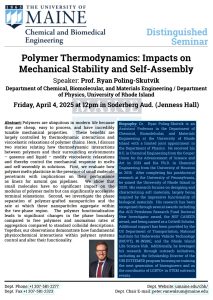
Bio: Dr. Ryan Poling-Skutvik is an Assistant Professor in the Department of Chemical, Biomolelcular, and Materials Engineering at the University of Rhode Island with a limited joint appointment in the Department of Physics. He received his B.E. in Chemical Engineering from the Cooper Union for the Advancement of Science and Art in 2013 and his Ph.D. in Chemical Engineering from the University of Houston in 2018. After completing his postdoctoral research at the University of Pennsylvania, he joined the University of Rhode Island in 2020. His research focuses on designing and characterizing soft materials, largely being inspired by the impressive functionality of biological materials. His research has been recognized through several awards including the ACS Petroleum Research Fund Doctoral New Investigator award, the NSF CAREER award, and being named as a Cottrell Scholar. Additional support has been provided by the US Department of Transportation, National Institute for Underwater Vehicle Technology (NIUVT), RI-INBRE, and the Rhode Island Life Science Hub. Additionally, he leverages his research through outreach initiatives, including as the Scholarship Director of the URI ESTEEMED program focusing on training the next generation of bioengineers and as the coordinator of LGBTQ+ in STEM outreach events.
Abstract: Polymers are ubiquitous in modern life because they are cheap, easy to process, and have incredibly tunable mechanical properties. These benefits are largely controlled by thermodynamic interactions and viscoelastic relaxations of polymer chains. Here, I discuss two stories relating how thermodynamic interactions between polymers and their surrounding environments – gaseous and liquid – modify viscoelastic relaxations and thereby control the mechanical response in melts and self-assembly in solutions. First, we evaluate how polymer melts plasticize in the presence of small molecule penetrants with implications on their performance as liners for natural gas pipelines. We show that small molecules have no significant impact on the modulus of polymer melts but can significantly accelerate terminal relaxations. Second, we investigate the phase separation of polymer-grafted nanoparticles and the rate at which these nanoparticles aggregate within the two-phase region. The polymer functionalization leads to significant changes in the phase boundary compared to free polymers and anomalous rates of aggregation compared to standard colloidal descriptions. Together, our observations demonstrate how fundamental physicochemical interactions within polymer systems control and alter their functionality.

